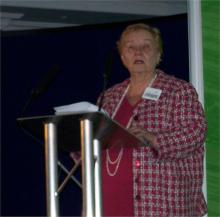
The 1970 General Election in Exeter
Many thanks to our project volunteer, Imogen Crarer, for this fantastic article.
The 1970 General Election is particularly memorable for the surprising victory of Edward Heath and the Conservative party. Going completely against the predications of the opinion polls, Heath won a clear majority of thirty seats after a 4.7 % swing in voter support - the largest recorded since 1945. Exeter’s experience of this General Election, with Conservative MP John Hannam’s unexpected defeat of Labour’s Gwyneth Dunwoody, was an interesting reflection of the national shift.
Historians have suggested a number of reasons for the Conservative’s sudden surge to electoral victory. David Butler and Michael Pinto-Duschinsky emphasise the early discontent with Labour occurring soon after the 1966 election as laying the foundations for Heath’s success. They argue that the ‘dramatic economic cuts’ made by Labour to prevent a run on the British pound sterling effectively thwarted George Brown’s National Plan as head of Department of Economic Affairs. This undermined Labour’s credibility and this combined with ‘the economic uncertainty’ experienced under Harold Wilson’s government from 1966-1970 strengthened the Conservative appeal. Butler also asserts that the second failed attempt to enter Britain into the European Common Market, the devaluation crisis of 1967, the beginnings of the Troubles in Northern Ireland and difficulties surrounding the anti-Vietnam War demonstrations significantly damaged Labour in the opinion polls. This potentially injurious political environment was largely overlooked. Labour subsequently recovered in the polls and the Conservatives had been thrown into disarray due to Enoch Powell’s controversial ‘Rivers of Blood’ speech on immigration in April 1968. The situation was so favourable for Labour that Wilson dissolved Parliament early, setting the election date for the 18th June.
Labour’s seemingly assured success, predicted by the polls, was overturned in the final days of the election campaign. Although Butler and Pinto-Duschinsky are hesitant in attributing too much significance to these late events, it is widely recognised they effectively stalled Labour’s momentum. The release of May’s poor balance of payment figures, England’s failure in the football World Cup and the announcement of some acute price rises combined to ‘break the spell’ just two days before Britain voted. Powell’s calls for his supporters to vote for the Conservatives, and the suspected abstaining of many Labour voters, also effected the “last minute swing” which ousted Wilson from office.
Exeter in particular reflects the pattern of the 1970 General Election. Voting in the constituency reflected the national decrease in electoral turnout. The 1970 election saw the lowest voting turnout since 1935 at 72%, despite it being the first election in which 18-year-olds could vote. Although it still enjoyed a turnout of 81.05%, Exeter’s electoral turnout did fall by 2.58% - just under the national figure of 3%. The wider Labour – Conservative battle was also embodied in Exeter. A victory for the incumbent Labour MP - Gwyneth Dunwoody - was widely expected along with a national Labour majority. On the side-bar, you can listen to Jeff Coates recount his experiences of the 1970 election as an active member of the University of Exeter’s Student Conservatives Association and Hannam’s campaign. Sir John Hannam (born in 1929) defeated Dunwoody with 45.02% of the constituency vote to her 42.38%. He remained MP for Exeter until his retirement in 1997 and was succeeded by Labour’s Ben Bradshaw. Gwyneth Dunwoody (1930-2008) had been elected as Exeter’s MP in 1966 and, despite unexpectedly losing her seat to Hannam, remained in politics as a formidable parliamentarian and went on to become the longest serving female MP.
Coates’ recollections also show Exeter to be a useful microcosm of the wider political currents. His recollection of Powell’s visit to the University in October 1968, and the impassioned reaction it provoked among the students both in support and in opposition to him, embodies the controversial and powerful effect Powell had on contemporary politics. The student fighting and rioting that broke out made the national news; this behaviour was symbolic of the increased political activity among students generally which was most clear in the demonstrations against war in Vietnam. Coates believes that the years immediately preceding the 1970 election, and the election itself, show the increasing importance of student activity in the local politics of Devon.
The 1970 General Election was a particularly memorable for Exeter because of the surprising Conservative victory locally and nationally. From the Grassroots wants to find out more about the experience of Devon regarding this political event. If you have memories of the 1970 election do get in touch!
Further reading:
D. Butler, British General Elections since 1945, 2nd edition (Oxford, 1995)
D. Butler, M. Pinto-Duschinsky, The British General Election of 1970 (London, 1971), see chapters 1-6, for a general summary see particularly pp.6-19
-
 Gwyneth Dunwoody, (C) Monostory Miklós from Wikimedia Commons
Gwyneth Dunwoody, (C) Monostory Miklós from Wikimedia Commons

